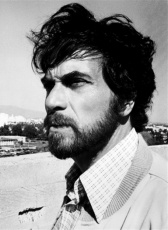Larry Peerce was born in 1930 in Bronx, New York, to the later Metropolitan Opera tenor Jan Peerce and his wife, Alice. Peerce's directorial career stretched from 1964 to 2001, embraced different genres and generated different results.
In the 1960s it seemed as if Peerce would become a major filmmaker. His first film, One Potato, Two Potato (1964), was a sensitively told story about an interracial marriage. It won an Academy Award nomination for Best Original Screenplay for Orville H. Hampton and Raphael Hayes, and garnered Barbara Barrie top acting honors at the Cannes Film Festival. While toiling on series TV in the mid-'60s, helming the westerns Branded (1965) and The Wild Wild West (1965), Peerce made a successful rock-and-roll concert film, The Big T.N.T. Show (1966), which showcased a lot of talent, including The Ronettes and producer Phil Spector. He next made the interesting The Incident (1967), a film based on a true story about a pair of teenage toughs terrorizing the riders on a subway car. The film was rough and gritty, which befitted the story, marked the screen debut of both Martin Sheen and Tony Musante and was Beau Bridges' introduction to adult roles.
Peerce seemed poised for the breakthrough to the "big time" with his film version of Philip Roth's novel, Goodbye, Columbus (1969), which was a critical and box-office success. He won a nomination for Best Director-Motion Pictures from the Directors Guild of America for the movie, while screenwriter Arnold Schulman won an Oscar nod for Best Adapted Screenplay and Ali MacGraw was launched on her brief career as a superstar.
However, with the change in decades, his talents seemingly floundered. The Sporting Club (1971) was a flop with critics and audiences, and his ambitious adaptation of John Knowles' coming-of-age novel A Separate Peace (1972) drifted away without making any impact. He next directed Elizabeth Taylor in the cosmetic-surgery potboiler Ash Wednesday (1973), which faded as fast as the diva's stalled career.
Turning to made-for-TV movies, Peerce had a success with the adoption drama The Stranger Who Looks Like Me (1974), then had two winners at the box office with The Other Side of the Mountain (1975) and its sequel. He next directed a disaster movie about a psychotic sniper loose in a football stadium, Two-Minute Warning (1976), one of the bloodiest movies made up to that time, which was severely edited when it ran on TV.
He failed when attempting a return to adaptations of memorable books, with his take on Sylvia Plath's novel The Bell Jar (1979). He continued to work in TV movies during the 1980s, but at the end of the decade had a major flop with his big-screen adaptation of Bob Woodward's John Belushi biography Wired (1989), though it did introduce actor Michael Chiklis. In the 1990s he stuck to TV movies, retiring in 2001 after helming Second Honeymoon (2001).

